Due to a non-functioning plugin, the FB Likes disappeared 🙁 – if you like the post you can re-start the Likes all over again!Have a brand-new Like button installed!
1117 people reached on Lassi with Lavina FB page -73 engagements.
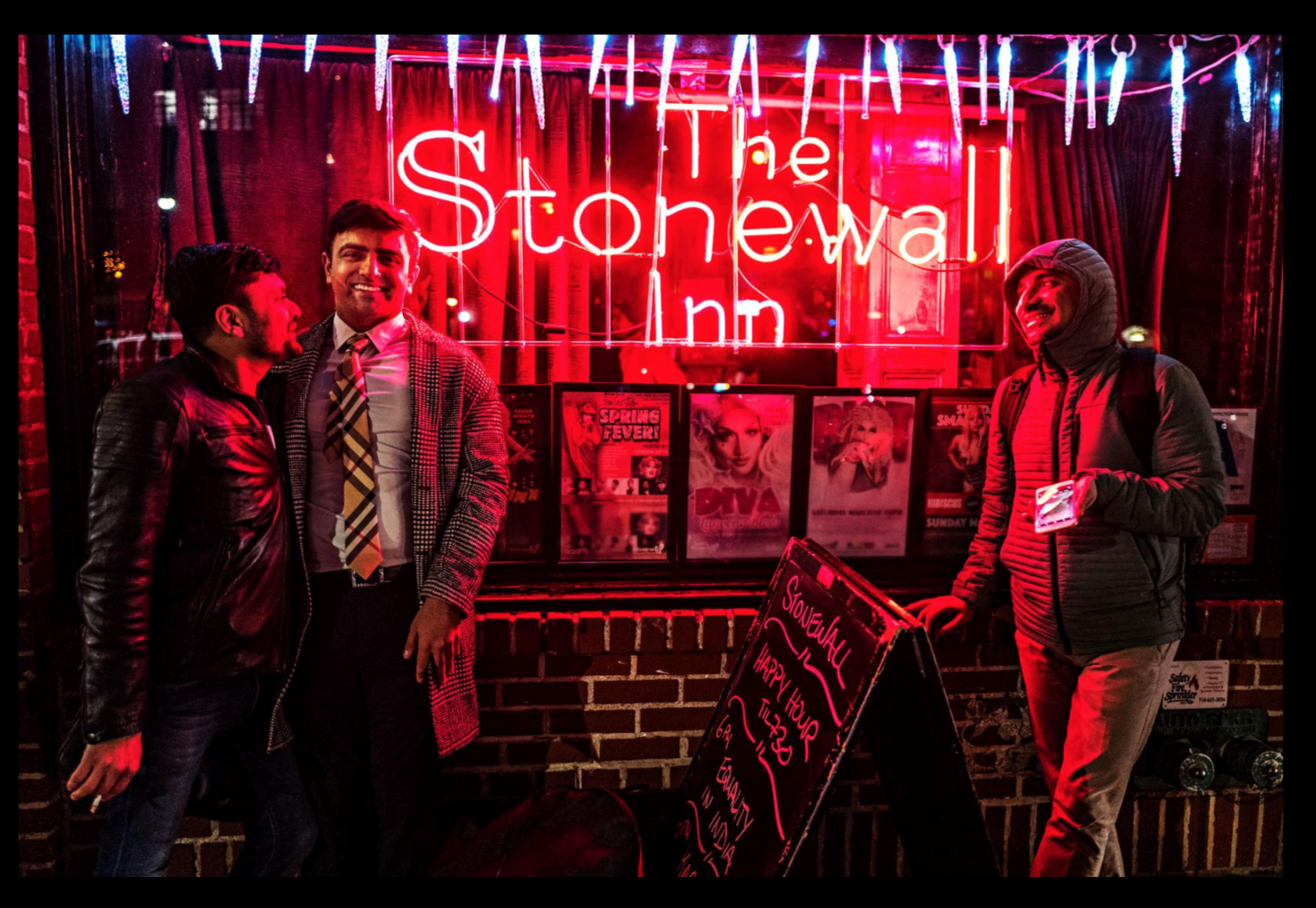
Celebrating Gay Pride month:
2019 marked the 50th anniversary of the Stonewall riots and for the Desi LGBTQ community, it was a watershed moment.
There was boisterous Bhangra and Bollywood music on the streets of New York– and no, it wasn’t Navratri, Baisakhi or even Holi – it was the annual Gay Pride March, and Indian gays, lesbians, bisexuals, queers and transexuals were coming out in the open and celebrating their sexual orientation and their community. No beating about the bush – they were out there, marching in solidarity with the larger American LGBTQ community and happy to be counted.
2019 marked the 50th anniversary of the Stonewall riots and for the LGBTQ community, it was a watershed moment when they stood up to hate and intolerance, the beginning of the gay rights movement.
“For many who marched or jammed the sidelines, it was hard to understand just how much prejudice was once directed at gay men, lesbians and transgender people. In 1969, laws in 49 states made gay sex between consenting adults a crime. In New York, it was illegal for two men to dance together until 1971,” wrote The New York Times.
For Indian gays with their vivid memories of homophobia and Article 377 in India, this 50th anniversary has been particularly sweet coupled as it is with World Pride Month and the Gay Pride Parade. The last weekend of June saw national celebration across many parts of the US.
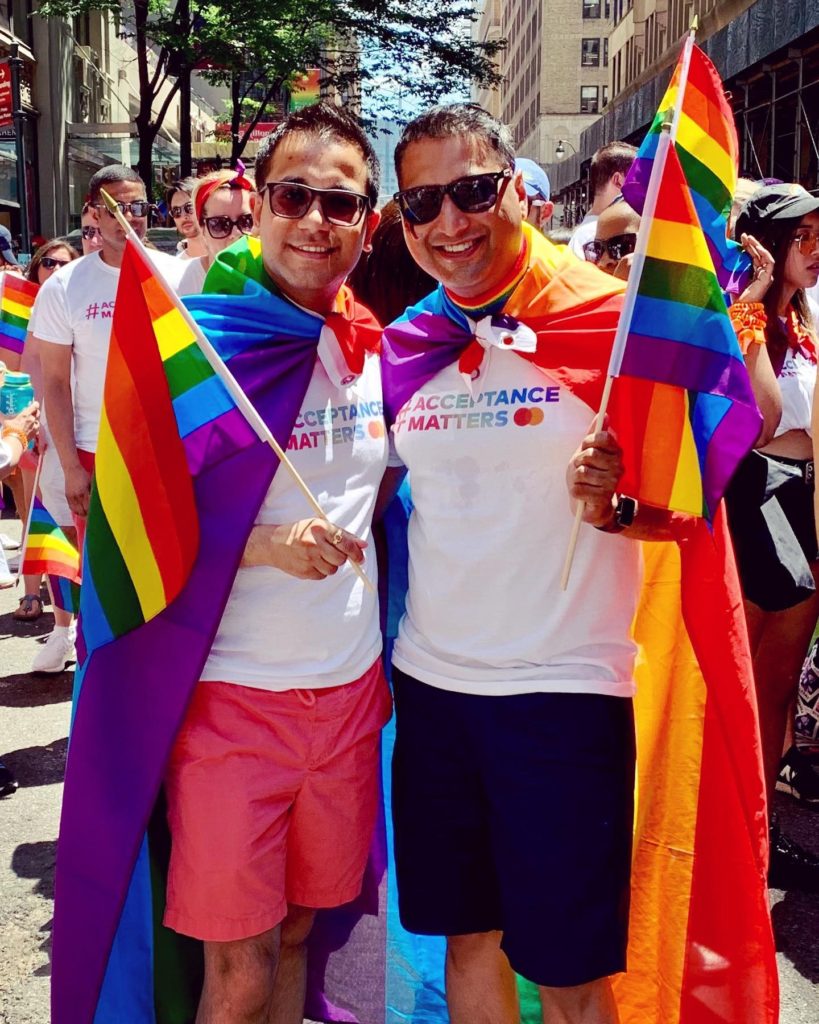
[dropcap]“A[/dropcap]s I walked down Fifth Avenue during World Pride yesterday and wearing a pride flag as a cape, I felt visible, I felt heard, I felt moved and I felt like a superhero,” says Vaibhav Jain, a global public health researcher. “I was so happy to walk hand in hand with my husband and show the world how proud I am of my sexual orientation and how far I’ve come from the days when I was bullied as a child in India.”
Earlier this year, Vaibhav Jain and Parag V. Mehta had got married in a traditional Jain ceremony in Central Texas, a big desi wedding with 500 guests. Mehta, who is the Executive Director for Mastercard’s Center for Inclusive Growth, believes that “the Stonewall riots in the summer of ‘69 signalled the end of victimhood and the beginning of acting up and fighting back. That night marked the beginning of the end of police brutality and violent hate crimes which disproportionately target transgender people of colour. It was the beginning of the end of stigma.”
As Joshua Patel, a young activist in New York says: “I feel strongly that in movements, we tend to take many steps forward and many backwards. It’s the nature of the beast.” Patel has worked closely with the Lakshya Trust, an organization founded by Prince Manvendra Singh Gohil, which strives to provide equal rights to LGBTQ people all over India. He is now working on starting a similar organization here.
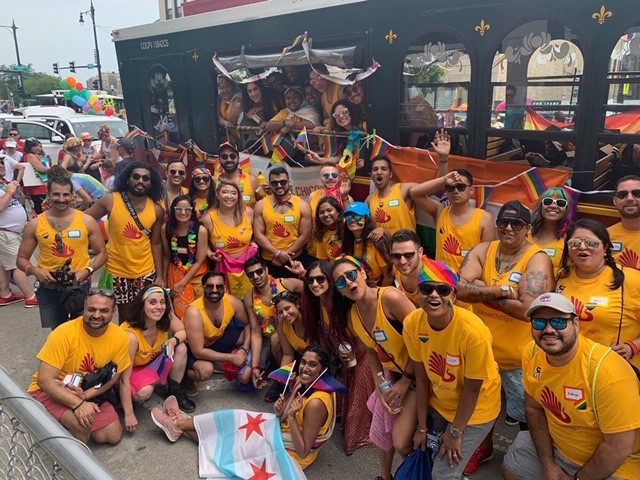
[dropcap]N[/dropcap]eeral Sheth of Chicago knows well of the benefits that have come to the gay community in recent years – In 2016 he and his partner Anu Hazra had a full-fledged big fat Indian wedding in Chicago officiated by a Hindu priestess, surrounded by family members from both sides. Sheth, who works on LGBTQ mental health and Hazra who works with marginalized communities with AIDS prevention, both marched in the parade with Trikone, one of the oldest gay advocacy groups in the US.
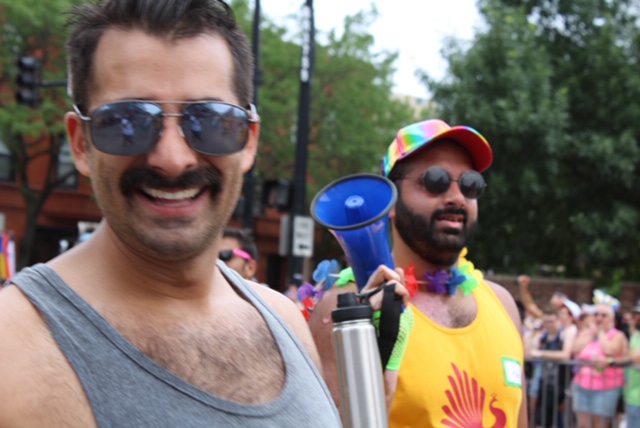
“Pride was so powerful for many of us. We Bhangra’d and garba’d our way through the gay district of Chicago, Boystown. Not only has it been 50 years since the riots at Stonewall, but it is the first pride for me after IPC 377 was overturned,” says Sheth. “ It feels like the LGBTQ+ South Asian community that I’m surrounded by has a greater sense of freedom and is energized by the progress that is being made in places like India and Bhutan in their decriminalization of homosexuality. Lots more needs to be done to move towards equality, but this was a significant first barrier that was finally overcome.”
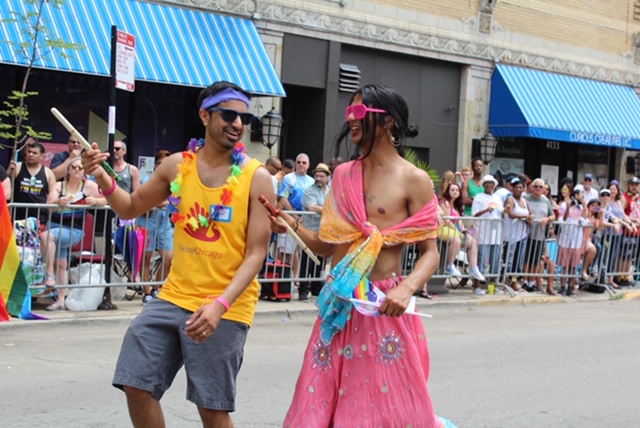
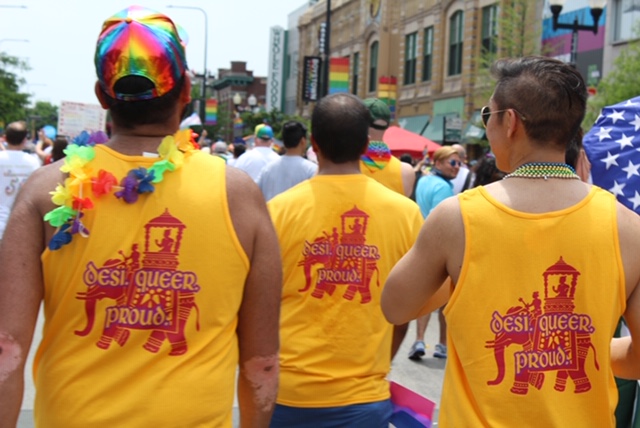
[dropcap]F[/dropcap]inally, what’s on the wish list of the Indian-American gay community? Says Joshua Patel: “I feel that we are just getting started. In the next 50 years, I would like to see the US ban conversion therapy in all states, provide more inclusive workplace programming for transgender citizens, and LGBTQ history curriculum added to elementary schools.
In India, I would like to see all these – with one critical addition – the right to marry the one you love. Marriage is not only a sacred union for families to provide blessings for, but it is a fundamental right for two consenting adults.”
Vaibhav Jain and Parag Mehta point out that many gains have been made since Stonewall – homosexuality has been decriminalized in the US, same-sex marriages have been legalized and children can be adopted or conceived via surrogacy by same-sex couples who also enjoy federal benefits just as do heterosexual couples.
Still as they admit, it’s still a rocky road ahead: LGBTQ individuals still don’t have any federal protection in the workplace and can be fired for just being who they are, transgender individuals have been banned from enlisting in the military service, and a recent judgment by the U.S. Supreme Court gives any individual the right to refuse services to LGBTQ individuals based on religious exemption.
As Neeral Sheth muses, “Right now is the time for people with privilege and in positions of power to make a difference by supporting the LGBTQ+ community in any way they can. The good news is, just like what happened after Stonewall, the community is empowered, mobilized, and growing. As more and more people demand equality, the other barriers will start to fall.”
Soham Chokshi, a transgender artist is writing a book. She expresses the feelings of many in the LGBTQ community when she says: “The challenges for LGBTQ+ people in our current “age of diversity and inclusion” and especially for transgender people of colour, are morphing into new, unforeseen challenges. Desi communities are often very insular, orthodox, and patriarchal. In the next 50 years, I’d like to see – both here and in India – a cultural and political shift in which the gifts, skills, and magic of LGBTQ+ people are cherished and utilized.”
Stonewall 50 – Reflections by Vaibhav Jain and Parag Mehta
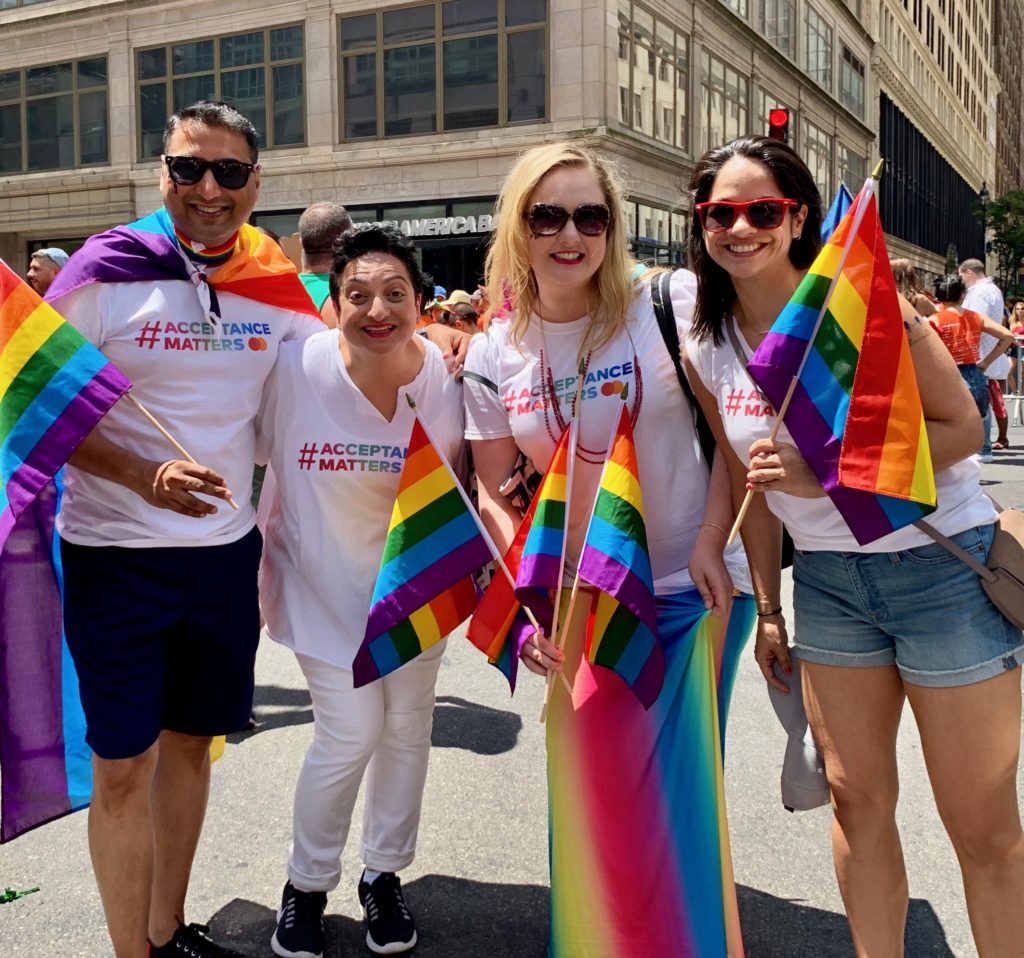
[dropcap]V[/dropcap]aibhav is a global public health researcher and works on issues related to of sexual and gender minorities. Language access for LGBTQ communities is an issue closest to his heart. Parag is a Senior Vice President and the Executive Director for Mastercard’s Center for Inclusive Growth — the philanthropic arm of the tech giant. Both Vaibhav and Parag have been LGBTQ and Asian American rights advocates for the past several years. Earlier this year in March, Vaibhav and Parag got married in a traditional Jain ceremony in Central Texas, after being together for seven years. The wedding was attended by over 500 guests including family and friends — which was the first of its kind for the Indian American community in the area.
What does the Gay Pride parade signify to you personally and what thoughts are evoked by Stonewall 50?
Vaibhav’s Reflections
[dropcap]W[/dropcap]hen I think of Pride, it brings about so many different emotions in my mind. As I walked down Fifth Avenue during World Pride yesterday and wearing a pride flag as a cape, I felt visible, I felt heard, I felt moved and I felt like a superhero. I was so happy to walk hand in hand with my husband and show the world how proud I am of my sexual orientation and how far I’ve come from the days when I was bullied as a child in India. Seeing thousands of LGBTQ people march and millions of spectators cheer on gave me so much hope for myself and everyone around the world. As I marched in the parade, I saw thousands of NYPD policemen protecting the parade route and the marchers and it got me thinking, fifty years ago these were the people who were fighting with us but today, they stand with us in support and solidarity.
But during all these feelings of pride, there’s always something lingering in the back of my mind. I still dream of seeing the same outpouring of love and support on streets of Delhi, Mumbai, Kolkata, Chennai, Amritsar, Lucknow… every big and small city in India. I learnt about the Stonewall Riots only when I moved to the United States in 2011 and it was fascinating to me that a small brawl outside of a bar in 1969, between a handful of queer people and the local police led to evolution for modern day gay rights movement. The fact that the sound of bricks, thrown in protest of the harassment and alienation faced by LGBTQ people, was heard all around the world and led to many other gay rights movement around the world amazed me then and even today. So many country in the world celebrates pride in the month of June to commemorate this historic event, however, even after 50 years of Stonewall, I think about all the countries that still persecute sexual minorities. They harass, imprison and execute their own people just because they choose to express who they are.
So, Pride Parade and Stonewall are definitely a happy celebration of all that we are proud of but they are also a somber reminder of all that we still need to achieve. This year like every year, I was also thankful to all the courageous LGBTQ souls who started the Stonewall Riots on June 28. Those brave women and men had decided that they had had enough and shed their blood and tears only to lead us out of a sea of despair into an ocean of hope. Pride is therefore an important reminder for all of us that our history, our stories and our visibility are our most powerful tools for progress, so we must always march on.
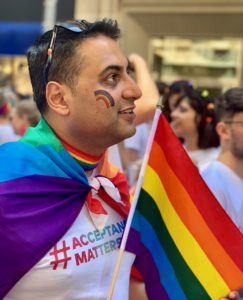
Parag’s Reflections
Stonewall was the beginning of the end. The end of bigotry fueled by fear and ignorance. The end of police raids and paddy wagons, of extortions and exposés, of going underground and living in closets. Five decades later, the story of the uprising reverberates with activists from Bogotá to Bangalore who remember the Stonewall Inn as if it were their Alamo. The Stonewall riots in the summer of ‘69 were the end of victimhood, the beginning of acting up and fighting back. That fighting spirit would serve us well when our government, the media and the medical industrial complex failed us completely during the plague that was yet to come. Silence equals death. Stonewall is where we learned to scream. That night marked the beginning of the end of police brutality and violent hate crimes which disproportionately target transgender people of color. It was the beginning of the end of stigma. After Stonewall, the American Psychiatric Association voted to declassify homosexuality as a mental disorder. Eventually, the U.S. Surgeon General would speak out against conversion therapy, affirming that, “Being gay is not a disorder. Being transgender is not a malady that requires a cure.”
What have been the triumphs for you both?
There were so many triumphs we achieved as a couple. The biggest one was to bringing a close-knit community of our friends and family to attend a same-sex wedding and bless our union — something that most of them had never attended or had no concept of. But such is the power of love, it transforms you in more ways than one. People tell us all the time that we took a bold step in choosing to get married in such a public and grand ceremony. However, the actions of our parents to make this wedding a reality and make it as normal as possible for us and for all in attendance, was the highlight of our wedding. The fact that unconditional love for us transformed our families to a point that they set aside decades of belief systems and supported our union and our happiness — that in our minds was our biggest triumph as a couple.
Finally – are we there yet? Or is it a rocky road still? What changes would you like to see in the next 50 years, both here and in India?
Yes, we have certainly made a lot of progress and we should celebrate all of that with pride. The nature of progress is that it takes its own pace. In the past 50 years, we have seen so much progress in the LGBTQ rights — we decriminalized homosexuality in the United States, we have the right to marry who we love (regardless of their gender), we can adopt children or have biological children via surrogacy and our same-sex spouses can get the same federal benefit, just like our heterosexual counterparts. However, we still have a long way to go. To cite a few disconcerting examples, LGBTQ individuals still don’t have any federal protection in the workplace and can be fired for just being who they are, transgender individuals have been banned from enlisting in the military service, a recent judgement by the U.S. Supreme Court gives any individual the right to refuse services to LGBTQ individuals based on religious exemption, several states actively pursue the debunked and inhumane practice of conversion therapy to “treat” LGBTQ people, and critical public health and other demographic data is still not being collected about LGBTQ populations on the federal level. Similarly in India, we have a lot to celebrate this year — from historic decriminalization of homosexuality to the landmark judgement on right to privacy — but we have so much more to aspire for in the coming decades including, legalization of same-sex marriage, right to adoption and equal rights for every LGBTQ citizen of India.
